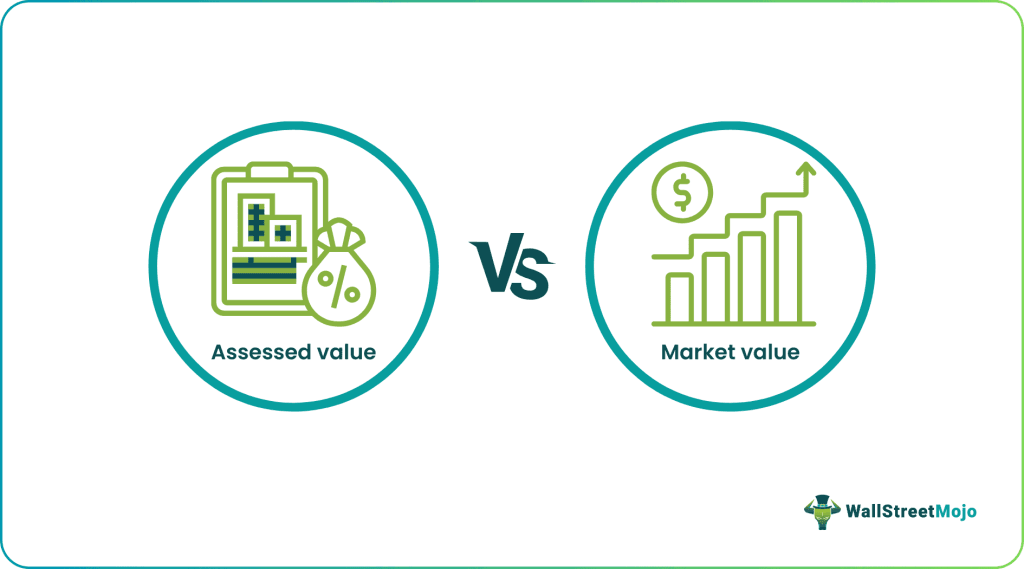Table Of Contents
Difference Between Assessed and Market Value
Assessed value and market value are mainly related to real estate valuation. They are used for valuing property where market value, as the name suggests, is the value of the property we receive if we plan to sell it today. On the other hand, the assessed value is based on standard procedures. It is used by local authorities and for tax purposes.
Assessed value and market value are terms related to real estate valuations that most people get confused about. Although they might sound similar and sometimes are used interchangeably, they are quite different from each other. Let us dive in further to understand this difference.
What is the Assessed Value?
The assessed value is calculated based on a standard procedure by the municipalities and the local administration. It is estimated mainly for tax calculations, directly proportional to the assessed value. The higher this value, the higher the tax levied.
For example, local authorities (city assessors) will determine the land rates and the houses constructed on these lands. These rates decide the amount of taxes that owners will be liable to pay.

What is Market Value?
A property is more than a piece of land or price per square foot. There are a lot of factors that decide how much property can be valued. The market value is the most probable price a property will fetch in today's open market. It is governed by the economic forces of demand and supply.
The more the buyers are interested in the property, the more value it can fetch for the seller and vice versa. Finally, the price buyers are ready to give, and a seller is prepared to accept an open market transaction. Real estate agents calculate the market value on behalf of their clients.
Video Explanation Of Assessed Value vs Market Value
Assessed Value vs. Market Value Infographics
Let us see the top differences between Assessed vs. Market Value.

Key Differences
The key differences are as follows –
#1 - Factors Affecting Calculation
The assessed value is usually less than the market value. This is because it is calculated based on a standard mechanism. An assessor will visit the property, thoroughly inspect the nearby houses and area, and come up with a fair value. For any area, local authorities would have pre-decided an assessment rate. The fair value calculated by the assessor is multiplied by the assessment rate, and the value thus derived is known as the assessed value. For example, the fair value was calculated as 500,000, and the pre-decided assessment rate was 80%.
Then, the assessed value will be
- =500,000 * 80%
- = 400,000
The calculation for market value is quite different and depends on many factors and market information available at that time. Some of the factors can be:
- The condition of the property:
- Age of the property
- Location
- Access and connectivity to highways and other major nearby areas.
- Disputed property
A real estate agent considers all these factors while calculating the market value. However, the factor that affects the most is demand and supply. If more buyers are interested in a property, it will fetch more market value than any similar property. On the other hand, even if the condition and accessibility of the property are satisfactory, some legal disputes are associated with it. The sellers might not be interested, and its market value can come down (sometimes even below the assessed value).
#2 - Impact of Market Fluctuations
While the market value of real estate can go up or down based on various factors, assessed value, to a large extent, is immune to such fluctuations. There are often scenarios when market value jumps overnight due to an announcement of government infrastructure projects like spending on a metro project, a new highway being built, etc. However, such announcements would not impact assessed value a lot as it changes only by a small amount based on the circle rates and annual inspections by local municipalities. In certain scenarios, the government keeps a cap that assessed value can only change by 5-6 % per annum.
To illustrate the impact of market fluctuations, where the assessed value was calculated as 400,000. Now, assume that an IT company has decided to build a new office near this property. As soon as this information is available in the market domain, the dynamics of the locality have changed, which will impact the current valuations. Since there is a new office, people working there would like to buy a house nearby to save travel costs and time.
Hence suddenly, the number of buyers has increased, which will shoot up the prices. The same land assessed at 400,000 could now be sold for as high as 600,000 or 800,000, which is nothing but the market value as this is where the buy and sell transactions will eventually take place. However, the important point is that property tax payable will still be calculated on the initially determined assessed value.
Assessed vs. Market Value Comparative Table
| Basis | Assessed Value | Market Value |
|---|---|---|
| 1. Usefulness / purpose | Resistant to market fluctuations It is used to calculate taxes. | Market value does get Impacted by local market fluctuations. It is the price at which the property will eventually be bought or sold. |
| 2. Factors affecting calculation | Assessment rate as decided by the municipalities | location, size, condition, improvements, recent transactions, or any other market information related to the property; |
| 3. Who calculates it | County assessor on behalf of a local municipality | Real estate agent on behalf of his client |
| 4. Calculated value | Normally less than market value is based on an assessment rate as the local authorities decide. | Demand and supply forces decide the market value. |
Conclusion
Houses, unlike other products, don't come with price tags. They don't have a fixed price but the prices that can change anytime. This is the reason we have the concepts of these values.
- The assessed value is more like a base price set by the government or local authorities, calculated by a standard procedure, and mainly determined for paperwork and tax calculations like annual property tax or one-time registry tax. It is recorded in the government files and does not often change- normally once a year.
- On the other hand, market value is a dynamic valuation determined by several factors, available information, and the buyer-seller ability to pay. It can change at any time (sometimes even overnight) and to any price. While buying or selling, one is more interested in the market value for transactional purposes. While owning(or residing), one is more interested in the assessed value for recurring tax calculations.

